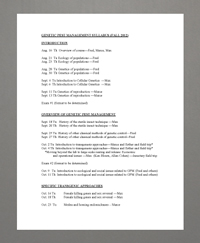Course 2
Taught each Fall semester to first year IGERT students
The goal of this course is to give all students an overview of the biological and social issues associated with GPM. Fred Gould (Entomology), Max Scott (Genetics), and Marce Lorenzen (Genetics) will coordinate the course and attend all sessions. The format of the course is two 75-minute lectures per week. Ecological, genetic, sociological, economic and communication principles are introduced at a level accessible by all students, but we then move on to primary literature readings. This is a broad and demanding course. Graduate students/postdocs with more expertise in a specific area will hold informal tutorial sessions with others who have less background. For some population genetics and epidemiology topics, we will have labs in which students will run our user-friendly computer simulation models to obtain a better idea of the dynamics of some GPM methods.
Other faculty members give lectures and/or lead discussions. Faculty members who have been involved with the development and regulation of transgenic crops will help to contrast GPM and transgenic crop issues. This is the first course that a cohort of IGERT students takes on campus and assists in their selection of tentative dissertation topics. It also exposes students to the broad range of IGERT faculty.
Baseline Learning Outcomes
After completing the course, students will be able to:
- Discuss the social, biological and policy histories of GPM and transgenic crops,
- Provide detailed examples where pest population suppression could result in displacement of human populations and indirectly decrease or increase biodiversity,
- Describe the molecular basis of sexual reproduction and embryogenesis,
- Accurately explain the general population genetic concepts undergirding population suppression and strain replacement GPM approaches,
- Describe the molecular biology concepts, transgenesis techniques and practical challenges involved in building specific engineered pest strains,
- Discuss how the ecology of specific pests and their habitats affect their status as feasible targets for specific GPM strategies,
- Participate in debates about specific proposed GPM projects and how to assess these projects effectively.
